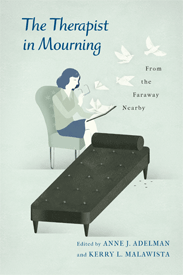 The unexpected loss of a client can be a lonely and isolating experience for therapists. While family and friends can ritually mourn the deceased, the nature of the therapeutic relationship prohibits therapists from engaging in such activities. Practitioners can only share memories of a client in circumscribed ways, while respecting the patient’s confidentiality. Therefore, they may find it difficult to discuss the things that made the therapeutic relationship meaningful. Similarly, when a therapist loses someone in their private lives, they are expected to isolate themselves from grief, since allowing one’s personal life to enter the working relationship can interfere with a client’s self-discovery and healing.
The unexpected loss of a client can be a lonely and isolating experience for therapists. While family and friends can ritually mourn the deceased, the nature of the therapeutic relationship prohibits therapists from engaging in such activities. Practitioners can only share memories of a client in circumscribed ways, while respecting the patient’s confidentiality. Therefore, they may find it difficult to discuss the things that made the therapeutic relationship meaningful. Similarly, when a therapist loses someone in their private lives, they are expected to isolate themselves from grief, since allowing one’s personal life to enter the working relationship can interfere with a client’s self-discovery and healing.